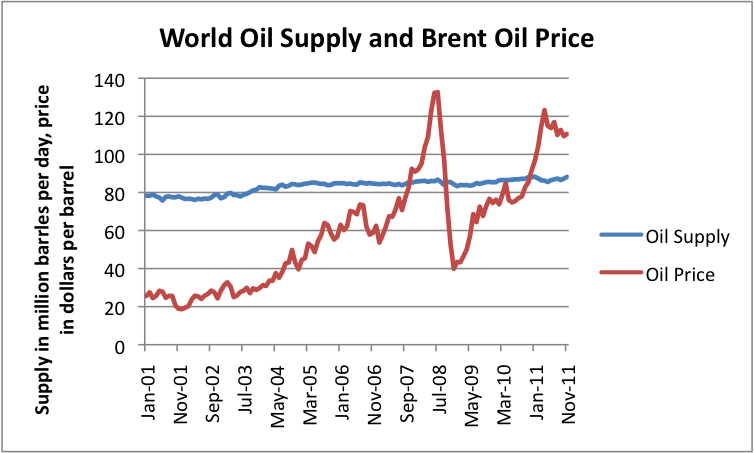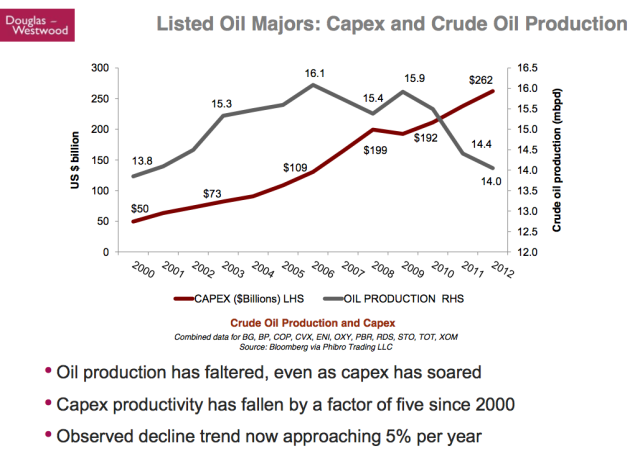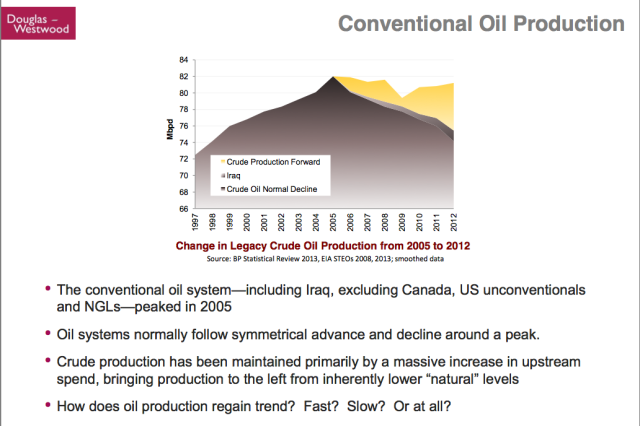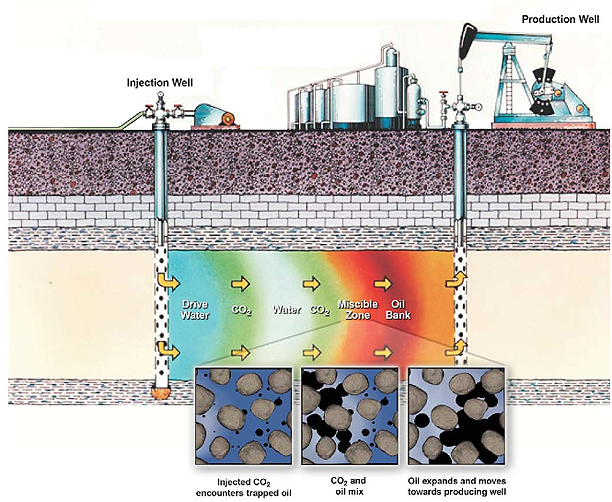Decline rate post peak
Re: How is oil production declining in mature fields?
Ken. Go to OXY and Kinder Morgan websites. They are two companies big into CO2 flooding. I think they list the units, like SACROC, Yates, Goldsmith, Wasson, etc. All of those units are in Texas Permian. Then go to Texas RRC interactive PDQ. There you can find monthly production records on each unit going back to 1993.
I have no experience w CO2, but read it has high expenses. Very corrosive, requires a lot of chemicals and lined tubing I think.
I have no experience w CO2, but read it has high expenses. Very corrosive, requires a lot of chemicals and lined tubing I think.
- shallow sand
- Lignite

- Posts: 256
- Joined: Wed 20 Aug 2014, 23:54:55
Re: How is oil production declining in mature fields?
kenberthiaume wrote: Obviously fields can't give oil forever, but one of the points of peak oil, that "oil discoveries peaked in the 1960s" or whatever is rendered almost irrelevent if they can keep upping the total oil harvested from a field.
For what it is worth, Ken. Oil discoveries peaked in the US in the 1930's.
A Saudi saying, "My father rode a camel. I drive a car. My son flies a jet-plane. His son will ride a camel."
-

MonteQuest - Expert

- Posts: 16593
- Joined: Mon 06 Sep 2004, 03:00:00
- Location: Westboro, MO
Re: How is oil production declining in mature fields?
kenberthiaume wrote: I wonder if there's a list somewhere of x field is declining 5% next year, even with investment etc.
Well, conventional oil production hasn't increased while the price has soared.

The oil majors have invested billions worldwide, yet production declines.

It has taken $2.5 trillion to add this new yellow block.

A Saudi saying, "My father rode a camel. I drive a car. My son flies a jet-plane. His son will ride a camel."
-

MonteQuest - Expert

- Posts: 16593
- Joined: Mon 06 Sep 2004, 03:00:00
- Location: Westboro, MO
Re: How is oil production declining in mature fields?
That's great stuff montequest. Do you have the site where that came from? I'm wondering how they came up with their chart with the yellow and the decline.
- kenberthiaume
- Wood

- Posts: 49
- Joined: Thu 06 Nov 2014, 15:23:04
Re: How is oil production declining in mature fields?
And lets not forget the title of this website: Peak Oil. Not Peak Recovery Rate or Peak any other metric. First, remember what I said about Weyburn being very unique success story. And that that success was due to tax payer monies making it possible: no company had be willing to make the required investment for the 35 years it was known that CO2 EOR was feasible IF it could be delivered to the field economically.
But forget that and look at the chart with Peak Oil Production Rate in mind...not additional bbls recovered or recovery factors. Think bopd. The field was down to about 13,000 bopd when the CO2 EOR began to kick in. At the peak of this phase production reached about 25,000 bopd. But only about 20,000 bopd was from the CO2. And somewhere around 2009 the recovery from CO2 begin to nosedive. Today the CO2 is doing about 15,000 bopd but only 10,000 bopd is from the CO2. IOW in 5 years the gain from this very expensive EOR effort (partly funded by the tax payers) has declined 50%.
And Weyburn is one of the of most successful CO2 EOR efforts I've ever seen with respect to increasing the production RATE. And one more time: the value of CO2 EOR has been known for decades. And every reservoir which could have improved recovery from CO2 injection and had CO2 available at an economic cost has had CO2 EOR applied to it. The only additional fields which will have CO2 EOR efforts applied will be those where new sources will be delivered as Denbury is currently doing in a rather limited manner.
I think some folks feel I'm saying CO2 EOR isn't a good approach. It's a fantastic technique. If you have the right type of reservoir AND if CO2 EOR hasn't already been done AND there is a source of CO2 that can be delivered to it at an economic cost. But to take some questimated number of all the residual oil in existing fields (including reservoirs in which the technic has no merit) and then assume CO2 will be delivered with no knowledge of its availability or cost to calculate the theoretical number of additional bbls that could still be recovered is not credible IMHO. And it's even more incredulous when you realize that what every the additional volume estimated it has to be offered in a time domain: it's the future bopd of the world that drives the POD...not X bbls of future oil production.
But forget that and look at the chart with Peak Oil Production Rate in mind...not additional bbls recovered or recovery factors. Think bopd. The field was down to about 13,000 bopd when the CO2 EOR began to kick in. At the peak of this phase production reached about 25,000 bopd. But only about 20,000 bopd was from the CO2. And somewhere around 2009 the recovery from CO2 begin to nosedive. Today the CO2 is doing about 15,000 bopd but only 10,000 bopd is from the CO2. IOW in 5 years the gain from this very expensive EOR effort (partly funded by the tax payers) has declined 50%.
And Weyburn is one of the of most successful CO2 EOR efforts I've ever seen with respect to increasing the production RATE. And one more time: the value of CO2 EOR has been known for decades. And every reservoir which could have improved recovery from CO2 injection and had CO2 available at an economic cost has had CO2 EOR applied to it. The only additional fields which will have CO2 EOR efforts applied will be those where new sources will be delivered as Denbury is currently doing in a rather limited manner.
I think some folks feel I'm saying CO2 EOR isn't a good approach. It's a fantastic technique. If you have the right type of reservoir AND if CO2 EOR hasn't already been done AND there is a source of CO2 that can be delivered to it at an economic cost. But to take some questimated number of all the residual oil in existing fields (including reservoirs in which the technic has no merit) and then assume CO2 will be delivered with no knowledge of its availability or cost to calculate the theoretical number of additional bbls that could still be recovered is not credible IMHO. And it's even more incredulous when you realize that what every the additional volume estimated it has to be offered in a time domain: it's the future bopd of the world that drives the POD...not X bbls of future oil production.
-

ROCKMAN - Expert

- Posts: 11397
- Joined: Tue 27 May 2008, 03:00:00
- Location: TEXAS
Re: How is oil production declining in mature fields?
ROCKMAN wrote: I'm trying to make the point that until the recent rise in oil prices all fields where CO2 injection could be used it was being utilized.
So..this is good then? Increased prices led to higher oil production, and can lead to even higher oil production from CO2 injection.
And one of the references I provided listed other places where CO2 could be utilized, so it doesn't seem that everything that can be done, at current prices, is being done...yet.
ROCKMAN wrote:So here's a field one might add to the rosy forecast of future EOR projects. Except one little problem: there is no CO2 available: all the available supply is going into those two offset fields. It will be decades before any is available for the field I reviewed.
Well, that might not EXACTLY be true, because of this:
http://www.ayreslawgroup.com/policy-ale ... verview-2/
ROCKMAN wrote:I don’t have time but you seem to know how to search the web: Weyburn is extremely unique. Dig deeper and you’ll see that.
Did you check out the reference provided showing that some appear to think that Weyburn isn't as unique as you might think?
ROCKMAN wrote:It’s very easy to project big future recovery from CO2 EOR in the US…if you ignore the lack of CO2 available to do it. Every time you see someone offer those big numbers dig deep and find out where the CO2 will come from. That will be difficult since most of those predictions don’t address that aspect. The word “if” is common in such presentations.
111D is not ignoring CO2, it is creating a supply of it to alleviate the issues mentioned in one of the references...which said the same thing you are here..not that Weyburn is unique, but that lack of CO2 supply is, and that might be handled with the new EPA regs.
- JohnnyOnTheFarm
- Wood

- Posts: 41
- Joined: Sun 02 Nov 2014, 21:04:25
Re: How is oil production declining in mature fields?
Tanada wrote:Rockman, has anyone done a combination water/CO2 flood to test its effectiveness?
Of course.
Table 1 here provides a list, although not all are WAG.
http://www.netl.doe.gov/kmd/cds/disk44/ ... report.pdf
- JohnnyOnTheFarm
- Wood

- Posts: 41
- Joined: Sun 02 Nov 2014, 21:04:25
Re: How is oil production declining in mature fields?
wake wrote:Rockman, silly question for you?
How come you can't just squirt regular air or nitrogen down there instead of CO2?
Certainly, in some fields (like this monster) you can.
http://en.wikipedia.org/wiki/Cantarell_Field
- JohnnyOnTheFarm
- Wood

- Posts: 41
- Joined: Sun 02 Nov 2014, 21:04:25
Re: How is oil production declining in mature fields?
Keith_McClary wrote:282,000 barrels per day = 15 MMmt per year.
60 MMmt per year of CO2.
So, 4 tons of CO2 per ton of oil.
Burning a ton of oil makes about 3.15 tons of CO2.
The irony of carbon capture and sequestration as part of an EOR project is pretty rich, isn't it?

It is almost a self sustainable project...burn a ton of oil...capture 3.1 tons of CO2...and go get another 3/4 ton of oil to burn, continue until it becomes uneconomic. Long live BAU I guess....
- JohnnyOnTheFarm
- Wood

- Posts: 41
- Joined: Sun 02 Nov 2014, 21:04:25
Re: How is oil production declining in mature fields?
I found this:ROCKMAN wrote:And unless they recycle the CO2 what comes out with the oil is vented to the atmosphere. I've yet to find what percentage is recycled but I suspect it's very small. The primary obstacle isn't capturing the CO2. Increasing the pressure to the point where it can be injected is usually too expensive.
CO2 recycle
During successful CO2 EOR operations, CO2 is produced along with oil and brine through
production wells (Figure 1, right side). As fluids are brought from reservoir depths to the surface
dense-phase CO2 (supercritical or liquid) flashes to gas and CO2 comes out of solution with oil
4and water. Although venting produced CO2 to the atmosphere would be permissible, because
CO2 is a valuable commodity, operators invest in separation facilities that extract CO2 and return
it to the injection stream. Efficiency of this return depends on CO2 handling losses from
separation, during equipment maintenance, from connections, and during equipment
malfunctions (upsets). Chuck Fox (oral presentation, 7th Annual EOR Carbon Management
Workshop, December 2009) presented results of a proprietary assessment from Kinder Morgan’s
West Texas showing losses during handling of <0.5% of total CO2 in the system.
https://mitei.mit.edu/system/files/hovorka.pdf
Facebook knows you're a dog.
-

Keith_McClary - Light Sweet Crude

- Posts: 7344
- Joined: Wed 21 Jul 2004, 03:00:00
- Location: Suburban tar sands
Re: How is oil production declining in mature fields?
kenberthiaume wrote:That's a good point. Not much "cheap" oil left.
What does "cheap" mean? And does it matter?
If it isn't "expensive" enough to stop this, then maybe it is still "too cheap".

I mean just look at what is going on in US sales...again...during these outrageous gasoline price days (or yesterdays, because we're back to <$3/gal prices all over the place).
Recession seems to come in handier causing a drop in sales than anything to do with fuel prices.

- JohnnyOnTheFarm
- Wood

- Posts: 41
- Joined: Sun 02 Nov 2014, 21:04:25
Re: How is oil production declining in mature fields?
kenberthiaume wrote:That's great stuff montequest. Do you have the site where that came from? I'm wondering how they came up with their chart with the yellow and the decline.
Sure Gail Tverberg over at http://www.ourfiniteworld.com
A Saudi saying, "My father rode a camel. I drive a car. My son flies a jet-plane. His son will ride a camel."
-

MonteQuest - Expert

- Posts: 16593
- Joined: Mon 06 Sep 2004, 03:00:00
- Location: Westboro, MO
Re: How is oil production declining in mature fields?
JohnnyOnTheFarm wrote:Tanada wrote:Rockman, has anyone done a combination water/CO2 flood to test its effectiveness?
Of course.
Table 1 here provides a list, although not all are WAG.
http://www.netl.doe.gov/kmd/cds/disk44/ ... report.pdf
Scanned the whole report, no references to using carbonated water flooding in there.
Alfred Tennyson wrote:We are not now that strength which in old days
Moved earth and heaven, that which we are, we are;
One equal temper of heroic hearts,
Made weak by time and fate, but strong in will
To strive, to seek, to find, and not to yield.
-

Tanada - Site Admin

- Posts: 17059
- Joined: Thu 28 Apr 2005, 03:00:00
- Location: South West shore Lake Erie, OH, USA
Re: How is oil production declining in mature fields?
tingTanada wrote:JohnnyOnTheFarm wrote:Tanada wrote:Rockman, has anyone done a combination water/CO2 flood to test its effectiveness?
Of course.
Table 1 here provides a list, although not all are WAG.
http://www.netl.doe.gov/kmd/cds/disk44/ ... report.pdf
Scanned the whole report, no references to using carbonated water flooding in there.
WAG is water alternating gas. In this case, CO2 gas.
Here is a graphic of what the "alternating" looks like as the fluid pulses propagate through the reservoir.

- JohnnyOnTheFarm
- Wood

- Posts: 41
- Joined: Sun 02 Nov 2014, 21:04:25
Re: How is oil production declining in mature fields?
Johnny - "...not that Weyburn is unique, but that lack of CO2 supply is, and that might be handled with the new EPA regs." Let me state it more clearly: the combination of the reservoir dynamics, the large amount of residual oil remaining AND the availability of tax payer supported CO2 delivery makes the Weyburn CO2 EOR project very unique.
And here’s another very unique situation: http://stateimpact.npr.org/texas/2012/0 ... -pump-oil/
The second largest single source of GHG in the US will have that output shipped about 80 miles away to be sequestered in a 60 year old oil field. How much additional recovery will the CO2 injection will achieve will take some years to determine. But the source of the GHG, the power plant, has also been operational for decades so the question once again: why hasn’t a company built a pipeline to transport the CO2 to any one of many dozens of old oil fields that are not only closer but also contain millions of bbls of residual oil? The plant sits right in the middle of one of the largest oil trends in the country. The operator of the targeted field estimates an additional 60 million bbls of oil recoverable via CO2 EOR. Reducing that oil volume for royalty and severance tax leaves the operator a net production of 42 million bbls of oil. Even at $50/bbl that would produce a cash flow of over $2 TRILLION.
So the field and the GHG source have been there for decades. Folks have known about CO2 EOR for decades. And the additional production could be worth $2+ TRILLION. So why wasn’t the project undertaken decades ago? I suspect part of the reason is that the $2 TRILLION cash flow doesn’t tell you anything about the rate of return this project would generate. No investment in the oil patch has even been made based on the ultimate revenue amount. It’s decided on the basis of risk adjusted rate of return which is a function of the timing of the cash flow. If that $2 trillion is recovered fast enough it will have an acceptable ROR. If it comes out too slowly the ROR won’t justify the investment. Same 60 million bbl recovery: one is a viable investment and the other isn’t.
And besides the obvious incentive produced in part by higher oil prices there’s an additional incentive: taxer payers are covering hundreds of $millions of this other project. And there’s also the potential mandate (as you link shows) for the feds to force such a project upon the plant owners. So again a coincidence of a variety of factors that make this CO2 EOR project rather unique IMHO…just like the Weyburn project. And again putting it into perspective: based upon the operators estimate the production rate will be increased by 15,000 bopd. So this new unique project will ultimately increase US oil production by 0.2%. It will increase the amount of current CO2 ERO production about 5%. But this won’t even offset the decline of the old conventional oilfields.
So it would appear that the remaining fields in which CO2 EOR might be technically viable will also take a similar set of factors coming together to push any of them into the “unique” category. So how many of those potential projects does anyone see this set of rather unique factors coming together?
And yes: that field in west Texas with 700 million bo at just 2,400’ with no CO2 available? I looked at the potential for a power plant source…none available. I also consider building a power plant to market electricity as well as utilizing the CO2 for EOR…economics still didn’t work. Even when I estimated the tax payers covering a lot of my costs I still couldn’t get the economics to work. Very frustrating: a proven 700+ million bo sitting just below the surface and all the current operator can manage Is 60 bopd.
Just like many EOR projects, alt energy projects, etc. that sound good on first blush the shine often tends to dim when the details are plugged in.
And here’s another very unique situation: http://stateimpact.npr.org/texas/2012/0 ... -pump-oil/
The second largest single source of GHG in the US will have that output shipped about 80 miles away to be sequestered in a 60 year old oil field. How much additional recovery will the CO2 injection will achieve will take some years to determine. But the source of the GHG, the power plant, has also been operational for decades so the question once again: why hasn’t a company built a pipeline to transport the CO2 to any one of many dozens of old oil fields that are not only closer but also contain millions of bbls of residual oil? The plant sits right in the middle of one of the largest oil trends in the country. The operator of the targeted field estimates an additional 60 million bbls of oil recoverable via CO2 EOR. Reducing that oil volume for royalty and severance tax leaves the operator a net production of 42 million bbls of oil. Even at $50/bbl that would produce a cash flow of over $2 TRILLION.
So the field and the GHG source have been there for decades. Folks have known about CO2 EOR for decades. And the additional production could be worth $2+ TRILLION. So why wasn’t the project undertaken decades ago? I suspect part of the reason is that the $2 TRILLION cash flow doesn’t tell you anything about the rate of return this project would generate. No investment in the oil patch has even been made based on the ultimate revenue amount. It’s decided on the basis of risk adjusted rate of return which is a function of the timing of the cash flow. If that $2 trillion is recovered fast enough it will have an acceptable ROR. If it comes out too slowly the ROR won’t justify the investment. Same 60 million bbl recovery: one is a viable investment and the other isn’t.
And besides the obvious incentive produced in part by higher oil prices there’s an additional incentive: taxer payers are covering hundreds of $millions of this other project. And there’s also the potential mandate (as you link shows) for the feds to force such a project upon the plant owners. So again a coincidence of a variety of factors that make this CO2 EOR project rather unique IMHO…just like the Weyburn project. And again putting it into perspective: based upon the operators estimate the production rate will be increased by 15,000 bopd. So this new unique project will ultimately increase US oil production by 0.2%. It will increase the amount of current CO2 ERO production about 5%. But this won’t even offset the decline of the old conventional oilfields.
So it would appear that the remaining fields in which CO2 EOR might be technically viable will also take a similar set of factors coming together to push any of them into the “unique” category. So how many of those potential projects does anyone see this set of rather unique factors coming together?
And yes: that field in west Texas with 700 million bo at just 2,400’ with no CO2 available? I looked at the potential for a power plant source…none available. I also consider building a power plant to market electricity as well as utilizing the CO2 for EOR…economics still didn’t work. Even when I estimated the tax payers covering a lot of my costs I still couldn’t get the economics to work. Very frustrating: a proven 700+ million bo sitting just below the surface and all the current operator can manage Is 60 bopd.
Just like many EOR projects, alt energy projects, etc. that sound good on first blush the shine often tends to dim when the details are plugged in.
-

ROCKMAN - Expert

- Posts: 11397
- Joined: Tue 27 May 2008, 03:00:00
- Location: TEXAS
Re: How is oil production declining in mature fields?
Seems how we are discussing different enhanced recovery options, has anyone looked into the economics of flooding with hydrogen gas? You would need to get it from electrolysis of water, but if you have a blowout at least you are not putting CO2 into the atmosphere. Hydrogen should mobilize petroleum quite well, and it is so small it can penetrate formations with really low porosity.
II Chronicles 7:14 if my people, who are called by my name, will humble themselves and pray and seek my face and turn from their wicked ways, then I will hear from heaven, and I will forgive their sin and will heal their land.
- Subjectivist
- Volunteer

- Posts: 4703
- Joined: Sat 28 Aug 2010, 07:38:26
- Location: Northwest Ohio
Re: How is oil production declining in mature fields?
ROCKMAN wrote:Johnny - "...not that Weyburn is unique, but that lack of CO2 supply is, and that might be handled with the new EPA regs." Let me state it more clearly: the combination of the reservoir dynamics, the large amount of residual oil remaining AND the availability of tax payer supported CO2 delivery makes the Weyburn CO2 EOR project very unique.
And here’s another very unique situation: http://stateimpact.npr.org/texas/2012/0 ... -pump-oil/
largest oil trends in the country. The operator of the targeted field estimates an additional 60 million bbls of oil recoverable via CO2 EOR. Reducing that oil volume for royalty and severance tax leaves the operator a net production of 42 million bbls of oil. Even at $50/bbl that would produce a cash flow of over $2 TRILLION.
f that $2 trillion is recovered fast enough it will have an acceptable ROR. If it comes out too slowly the ROR won’t justify the investment. Same 60 million bbl recovery: one is a viable investment and the other isn’t.
frustrating: a proven 700+ million bo sitting just below the surface and all the current operator can manage Is 60 bopd.
Just like many EOR projects, alt energy projects, etc. that sound good on first blush the shine often tends to dim when the details are plugged in.
I think you meant 60 million bbl wouuld be 3 billion at $50 barrel profit. Same point....if it were cost effective, they'd do it.
- kenberthiaume
- Wood

- Posts: 49
- Joined: Thu 06 Nov 2014, 15:23:04
Re: How is oil production declining in mature fields?
ken - You gotta watch us deceitful oil patch bastards when we toss numbers around. He estimates 60 million bbls recoverable. But his company doesn't get to keep all that oil. I've estimating about 25% goes to the land owners as royalty and another 5% goes to the state and county as production taxes. So he only nets from the sale of 42 million bbls. And I didn't bother to back out the actual cost of the injection...I still haven't found out if he's getting the CO2 for free or if he has to pay something for it. I also didn't back out his overhead for operating the wells. Those factors alone could run him several million per year.
-

ROCKMAN - Expert

- Posts: 11397
- Joined: Tue 27 May 2008, 03:00:00
- Location: TEXAS
Re: How is oil production declining in mature fields?
I said in another thread, that it seems KSA doesn't believe in peak oil. IF they did, they wouldn't be glutting the market when today's surpluses are only temporary due to declining fields in the future.
I read another cnbc article that said the US could be a net oil exporter by 2020. That seems strange to me, wouldn't that imply about a 10m bpd increase in production in 6 years?
At that point shale would be producing about 15 m bpd or 5 billion barrels a year? There's debate about the size of the shale plays but they'd be gone in a 10-20 years even with optimistic assumptions, I'd think at that pace.
I read another cnbc article that said the US could be a net oil exporter by 2020. That seems strange to me, wouldn't that imply about a 10m bpd increase in production in 6 years?
At that point shale would be producing about 15 m bpd or 5 billion barrels a year? There's debate about the size of the shale plays but they'd be gone in a 10-20 years even with optimistic assumptions, I'd think at that pace.
- kenberthiaume
- Wood

- Posts: 49
- Joined: Thu 06 Nov 2014, 15:23:04
Who is online
Users browsing this forum: No registered users and 34 guests
